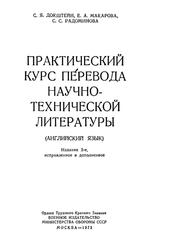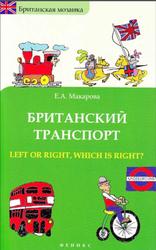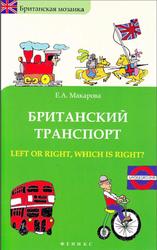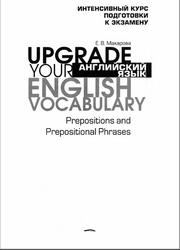«Английский язык для психологов» — дважды лауреат Всероссийского конкурса на лучшую научную книгу и удостоен дипломов Фонда развития отечественного образования. Учебник охватывает широкий диапазон психологических проблем, состоит из семи тематических глав и рассчитан на 380 часов аудиторной работы и 300 часов самостоятельной работы. Тексты предназначены для чтения со словарем и без словаря. Различная сложность текстового материала позволяет использовать их для чтения с пониманием, для перевода, а также для обсуждения и аннотирования на I—II курсах неязыковых вузов. Разнообразные предтекстовые задания помогут студентам лучше усвоить профессиональную лексику, послетекстовые упражнения подготовят их к беседе на профессиональные темы. Задания в каждой главе направлены на развитие речевых и коммуникативных умений и навыков. Групповая и парная работа, предусмотренная в учебнике, поможет преподавателю лучше использовать творческий потенциал студентов. Психологические тесты и логические задачи, анкеты и шутливые задания помогут сделать аудиторные занятия интересными и положительно повлияют на формирование мотивации студентов к изучению иностранного языка. Издание может быть полезно для подготовки к сдаче кандидатских экзаменов и к научно-практическим конференциям.
Русско-английский и англо-русский словарь может быть использован не только при чтении текстов данного издания, но и при переводе научных статей и подготовке докладов при самостоятельном изучении английского языка для профессионального использования. Соответствует Федеральному государственному образовательному стандарту высшего образования четвертого поколения. Рекомендовано студентам факультетов психологии высших учебных заведений, а также специалистам в этой области.
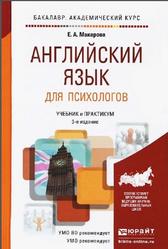
INTRODUCTION TO PSYCHOLOGY.
What is psychology? How is it connected to biology? What’s the origin of the word? Read the definitions and try to explain in your own words.
Psycho- is a learned borrowing from Greek meaning breath, soul, spirit, and mind. In Greek mythology Psyche (soul or butterfly) was the human bride of Eros, the god of love. Before she is allowed to many Eros she is forced to undergo many difficult ordeals. Apuleius tells the story of Eros and Psyche in his Metamorphoses. Psychology was considered a study of the soul.
Psychology is 1) the science of the mind or of mental states and processes: the science of human nature: 2) the science of human and animal behaviour; 3) the sum of the mental states and processes of the person or of a number of persons, especially as determining action (e.g. the psychology of a soldier at the battle). Literally, the word psychology means the science of the mind. Most contemporary psychologists would define psychology as the science of the behaviour of organisms. By behaviour they mean activities and processes that can be observed objectively — both the isolated reactions of muscles, glands and other parts of the organisms and the organized, goal-directed patterns of reaction that characterize the organism as a whole. Psychologists also interpret behaviour to include internal processes — thinking, emotional reactions and the like — which one person cannot observe directly in another but which can be inferred from observation of external behaviour.
Behaviour is determined by a complex of factors that are partly biological, partly anthropological, partly sociological, and partly psychological. Therefore, psychology is closely connected to both the biological and the social sciences. Psychologists study basic functions such as learning, memory, language, thinking, emotions, and motives. They investigate development throughout mental and physical health care. They also treat people who are emotionally distressed.
Context
Предисловие
Introduction to psychology
CHAPTER 1. The sense organs
(A review of basic grammatical structures: Present Tenses, Passive Voice
Reading 1. The sense of hearing
Reading 2. The senses of smell and taste
Reading 3. The sense of sight
Reading 4. The sense of touch. The meaning of touch
Reading 5. Scientists say aromas have major effect on emotions
CHAPTER 2. The human brain and its functions
(A review of basic grammatical structures: Past Tenses, question
Reading 1. The human brain — new discoveries
Reading 2. The mental edge
Reading 3. Personality — nature or nurture?
Reading 4. The bilingual brain
Reading 5. Do you know your right brain from your left?
Reading 6. Left-handedness
Reading 7. What is intelligence? Psychometric approach
Reading 8. Gardner's eight intelligences. Learning styles
Reading 9. The brain gain
CHAPTER 3. Memory
(A review of basic grammatical structures: Passive Voice, Perfect Tenses, question types, prepositions)
Reading i. How good is your memory?
Reading 2. A memory for all seasonings
Reading 3. May's boy
Reading 4. Mistaken identity
CHAPTER 4. Stress
( Modal verbs and related structures)
Reading 1. Introduction to stress
Reading 2. History of stress research
Reading 3. Stress and illness
Reading 4. Chocolate: a world favorite
CHAPTER 5. Perception
(Infinitives, Gerunds and other verb forms)
Reading 1. Perception
Reading 2. Perception and perceiver-distortion illusions
Reading 3. Illusions
Reading 4. Illusions of psychiatric significance
Reading 5. What’s your favorite color? Color in my life
CHAPTER 6. Abnormal psychology
(Infinitives, Gerunds, Modals and other verb forms)
Reading 1. Introduction to mental disorders
Reading 2. Mental disorders
Reading 3. Phobic disorder or neurosis
Reading 4. Afraid to fly?
Reading 5. Children’s fears
CHAPTER 7. Miscellaneous readings
(Conditionals. Comparative and superlative adjectives)
Reading 1. Shyness and blushing
Reading 2. Handwriting analysis
Reading 3. Headaches
Reading 4. Sleep and dream
Reading 5. The secrets of your dream
Reading 6. Talk to yourself
Reading 7. Learn to lighten up and live longer. Translating blushes and other body language. How to control hostility
Reading 8. Bad body image. Phisyognomy
Answer keys to chapters
Extension activities and brainteasers
Answer keys to extension activities and brainteasers
Grammar reference
Glossary
List of abbreviations
Russian-English vocabulary
English-Russian vocabulary
Bibliography.
Купить .
По кнопкам выше и ниже «Купить бумажную книгу» и по ссылке «Купить» можно купить эту книгу с доставкой по всей России и похожие книги по самой лучшей цене в бумажном виде на сайтах официальных интернет магазинов Лабиринт, Озон, Буквоед, Читай-город, Литрес, My-shop, Book24, Books.ru.
По кнопке «Купить и скачать электронную книгу» можно купить эту книгу в электронном виде в официальном интернет магазине «Литрес», и потом ее скачать на сайте Литреса.
По кнопке «Найти похожие материалы на других сайтах» можно найти похожие материалы на других сайтах.
On the buttons above and below you can buy the book in official online stores Labirint, Ozon and others. Also you can search related and similar materials on other sites.
Хештеги: #учебник по английскому языку :: #английский язык :: #Макарова
Смотрите также учебники, книги и учебные материалы:
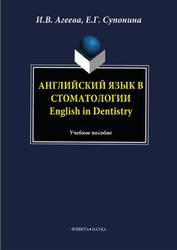 Английский язык в стоматологии, English in Dentistry, Агеева И.В., Супонина Е.Г., 2013 — Цель пособия - формирование у студентов англоязычной коммуникативной компетенции, что позволяет использовать английский язык в качестве инструмента профессиональной коммуникации и … Книги по английскому языку
Английский язык в стоматологии, English in Dentistry, Агеева И.В., Супонина Е.Г., 2013 — Цель пособия - формирование у студентов англоязычной коммуникативной компетенции, что позволяет использовать английский язык в качестве инструмента профессиональной коммуникации и … Книги по английскому языку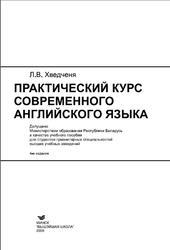 Практический курс современного английского языка, Хведченя Л.В., 2009 — Представляет собой базовое учебное пособие для студентов вузов гуманитарного профиля. Рассчитано на 300 часов аудиторного времени и обеспечивает весь учебный … Книги по английскому языку
Практический курс современного английского языка, Хведченя Л.В., 2009 — Представляет собой базовое учебное пособие для студентов вузов гуманитарного профиля. Рассчитано на 300 часов аудиторного времени и обеспечивает весь учебный … Книги по английскому языку Начни говорить по-английски, Start Speaking English, Интенсивный курс, Христорождественская Л.П., 2011 — Пособие представляет интенсивный курс обучения разговорному английскому языку. Состоит из 39 уроков, последовательно связанных между собой тематически, лексически и грамматически. … Книги по английскому языку
Начни говорить по-английски, Start Speaking English, Интенсивный курс, Христорождественская Л.П., 2011 — Пособие представляет интенсивный курс обучения разговорному английскому языку. Состоит из 39 уроков, последовательно связанных между собой тематически, лексически и грамматически. … Книги по английскому языку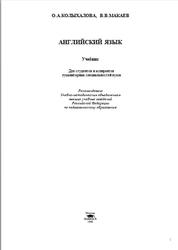 Английский язык, Колыхалова О.А., Макаев В.В., 1998 — Учебник написан молодыми специалистами в области филологии и педагогики, использующими в своей работе классические принципы дидактики и современные направления в … Книги по английскому языку
Английский язык, Колыхалова О.А., Макаев В.В., 1998 — Учебник написан молодыми специалистами в области филологии и педагогики, использующими в своей работе классические принципы дидактики и современные направления в … Книги по английскому языку
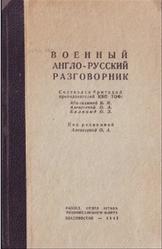 Военный англо-русский разговорник, Абалихина В.М., Алексеевой О.А., Балкинд О.З., 1942 — Halt! Стой! Who are you? Кто вы (Кто ты?) What are you? Кто вы (Кто ты?) Surrender! Сдавайся! Dismount! Слезай … Книги по английскому языку
Военный англо-русский разговорник, Абалихина В.М., Алексеевой О.А., Балкинд О.З., 1942 — Halt! Стой! Who are you? Кто вы (Кто ты?) What are you? Кто вы (Кто ты?) Surrender! Сдавайся! Dismount! Слезай … Книги по английскому языку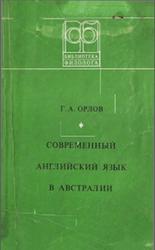 Современный английский язык в Австралии, Орлов Г.А., 1978 — Пособие посвящено описанию специфических черт современного английского языка в Австралии, которые рассматриваются в контексте языковой системы. В книге дается краткий … Книги по английскому языку
Современный английский язык в Австралии, Орлов Г.А., 1978 — Пособие посвящено описанию специфических черт современного английского языка в Австралии, которые рассматриваются в контексте языковой системы. В книге дается краткий … Книги по английскому языку Английская грамматика в пословицах, поговорках, идиомах и изречениях, Медведева Л.М., 1990 — В учебном пособии в качестве материала для изучения грамматики английского языка использованы пословицы, поговорки, а также идиоматические выражения. Упражнения, разработанные … Книги по английскому языку
Английская грамматика в пословицах, поговорках, идиомах и изречениях, Медведева Л.М., 1990 — В учебном пособии в качестве материала для изучения грамматики английского языка использованы пословицы, поговорки, а также идиоматические выражения. Упражнения, разработанные … Книги по английскому языку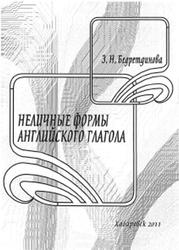 Неличные формы английского глагола, Бедретдинова З.Н., 2011 — Цель данного пособия состоит в том, чтобы раскрыть особенности английских неличных форм - инфинитива, причастий и герундия - и конструкций … Книги по английскому языку
Неличные формы английского глагола, Бедретдинова З.Н., 2011 — Цель данного пособия состоит в том, чтобы раскрыть особенности английских неличных форм - инфинитива, причастий и герундия - и конструкций … Книги по английскому языку

